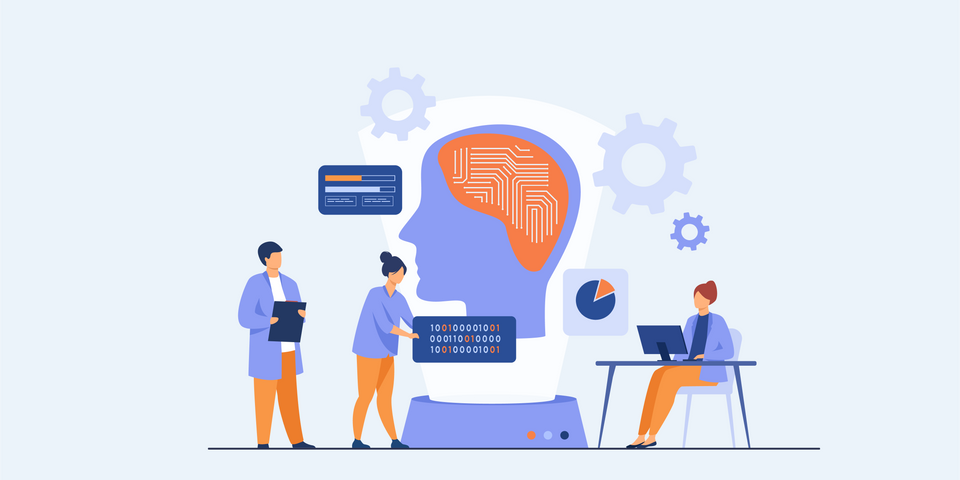AI Revolutionizing Stock Market Analysis in India !

Artificial Intelligence (AI) is transforming various industries, and the financial sector is no exception. In India, AI is revolutionizing stock market analysis, offering sophisticated tools and insights to investors, traders, and financial institutions. By harnessing the power of AI, stock market participants can gain a competitive edge, make more informed decisions, and navigate the complexities of the Indian stock market with greater precision. In this blog, we will explore the role of Artificial Intelligence in stock market analysis in India and understand how it is reshaping the landscape of financial investments.
Data Processing and Analysis
AI-powered algorithms can process vast amounts of financial data in real-time, including market news, historical stock prices, company reports, and economic indicators. This capability enables AI to identify patterns, trends, and correlations that human analysts may miss, providing valuable insights for making investment decisions.
Predictive Analytics
AI employs predictive analytics to forecast stock prices and market trends. By analyzing historical market data and using machine learning algorithms, AI can generate predictions on stock performance, helping investors identify potential opportunities and risks.
Sentiment Analysis
AI can perform sentiment analysis on news articles, social media, and other textual data to gauge market sentiment. This information can be crucial in understanding how positive or negative sentiments impact stock prices and market movements.
Robo-Advisors
AI-powered robo-advisors have gained prominence in India, providing automated investment advice and portfolio management services to individual investors. These platforms use AI algorithms to customize investment strategies based on individual risk profiles and financial goals.
Trading Algorithms
AI-driven trading algorithms execute trades based on predefined rules and market data. High-frequency trading (HFT) strategies, which rely on AI, allow institutions to execute large volumes of trades at high speeds, capitalizing on market inefficiencies.
Risk Management
AI models can assess and manage risk by analyzing historical market data and simulating various scenarios. This helps investors and financial institutions optimize risk-adjusted returns and create more resilient portfolios.
Fraud Detection and Compliance
AI can assist in detecting fraudulent activities and ensuring compliance with regulatory requirements. Financial institutions can use AI to monitor transactions and identify suspicious patterns to prevent fraud and adhere to regulatory standards.
The Future of AI in Stock Market Analysis in India
As AI continues to advance, its role in stock market analysis in India is only expected to grow. AI is likely to become more integral in aiding investors, traders, and financial institutions in making data-driven decisions, optimizing portfolios, and enhancing risk management strategies. Moreover, as the Indian stock market becomes increasingly sophisticated and competitive, AI will play a pivotal role in empowering investors to navigate the market landscape with greater efficiency and effectiveness.
Conclusion
The integration of Artificial Intelligence in stock market analysis in India is a game-changer, providing market participants with powerful tools to gain insights, manage risk, and optimize investment strategies. From predictive analytics and sentiment analysis to robo-advisors and trading algorithms, AI is reshaping the landscape of financial investments in India. As investors and institutions embrace the potential of AI-driven analysis, they are better equipped to seize opportunities and navigate the dynamic Indian stock market with greater confidence and success.
FAQ
1. How is AI transforming stock market analysis in India?
AI is revolutionizing stock market analysis in India by processing vast amounts of financial data in real-time, providing predictive analytics, performing sentiment analysis, offering robo-advisory services, executing trading algorithms, managing risk, and detecting fraud. These capabilities enable more informed decision-making and efficient market navigation.
2. What types of data does AI process for stock market analysis?
AI processes a wide range of data, including market news, historical stock prices, company reports, economic indicators, social media, and other textual data. This comprehensive data processing helps identify patterns, trends, and correlations.
3. How does AI use predictive analytics in stock market analysis?
AI employs predictive analytics by analyzing historical market data and using machine learning algorithms to forecast stock prices and market trends. This helps investors identify potential opportunities and risks in the market.
4. What is sentiment analysis and how does AI perform it?
Sentiment analysis involves evaluating the sentiment expressed in news articles, social media, and other textual data to gauge market sentiment. AI performs sentiment analysis by using natural language processing (NLP) techniques to understand how positive or negative sentiments impact stock prices and market movements.
5. What are robo-advisors and how do they use AI?
Robo-advisors are AI-powered platforms that provide automated investment advice and portfolio management services. They use AI algorithms to customize investment strategies based on individual risk profiles and financial goals, making investment decisions more accessible to individual investors.
6. How do AI-driven trading algorithms work?
AI-driven trading algorithms execute trades based on predefined rules and market data. High-frequency trading (HFT) strategies, which rely on AI, allow institutions to execute large volumes of trades at high speeds, capitalizing on market inefficiencies.
7. How does AI assist in risk management?
AI models assess and manage risk by analyzing historical market data and simulating various scenarios. This helps investors and financial institutions optimize risk-adjusted returns and create more resilient portfolios.
8. What role does AI play in fraud detection and compliance?
AI assists in detecting fraudulent activities and ensuring compliance with regulatory requirements by monitoring transactions and identifying suspicious patterns. This helps financial institutions prevent fraud and adhere to regulatory standards.
9. What is the future of AI in stock market analysis in India?
As AI continues to advance, its role in stock market analysis in India is expected to grow. AI will become more integral in aiding investors, traders, and financial institutions in making data-driven decisions, optimizing portfolios, and enhancing risk management strategies.
10. What are the benefits of integrating AI into stock market analysis?
The integration of AI into stock market analysis provides powerful tools for gaining insights, managing risk, and optimizing investment strategies. AI-driven analysis enables market participants to navigate the dynamic Indian stock market with greater confidence and success.
11. How can investors and institutions leverage AI in stock market analysis?
Investors and institutions can leverage AI by using AI-powered tools and platforms for data processing, predictive analytics, sentiment analysis, robo-advisory services, trading algorithms, risk management, and fraud detection to enhance their investment strategies and decision-making processes.






Member discussion